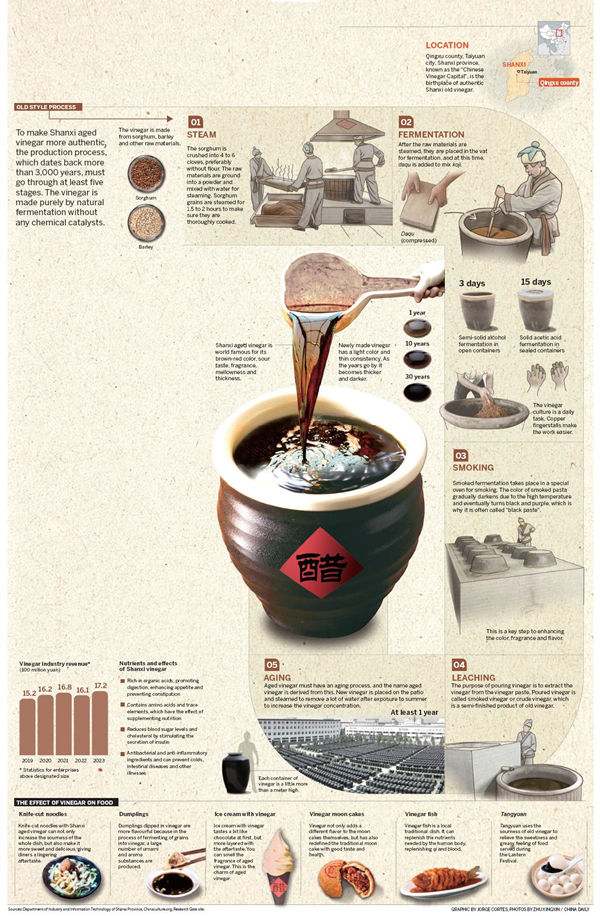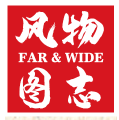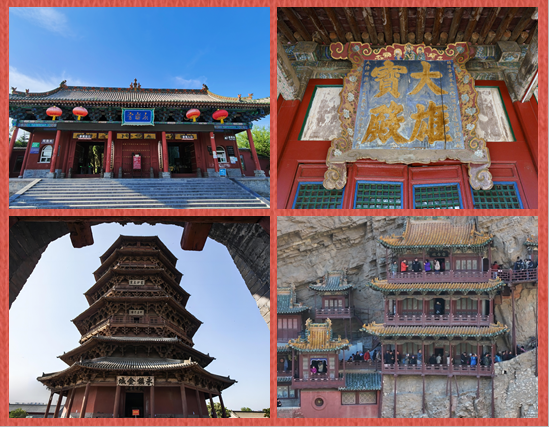More than just sour
Updated: 2024-07-26
[Video by China Daily]
Mature vinegar industry follows ancient methods but adds a modern twist
Editor's Note: Using a blend of words and visuals, this series explores unique communities and reveals the heart of China through food, architecture, craftsmanship, landscapes and traditions.
When it comes to Chinese cuisine, high-quality vinegar provides a distinctive zing that can turn a dish into a prized part of the nation's cultural heritage.
Qingxu county in Taiyuan, Shanxi province, has been a concentrated production area of high-quality sorghum since ancient times, and craft workshops that produce vinegar from it are everywhere. The mature vinegar made here was well-known far and wide and carried by Shanxi merchants during the successive Ming and Qing dynasties from 1368 to 1911.
The work is done mostly by hand to this day.
In 2006, the county's brewing technique was included on the first national-level intangible cultural heritage list.
Inside a workshop at Shanxi's Shuita Vinegar Co, which was built in ancient architectural style, employees dressed in Ming Dynasty clothing are busy performing traditional vinegar brewing tasks, such as hand milling, fermentation and filtration.
"They are not actors but real workers," said Zhang Ce, general manager. "With the rapid development of the company, our customers have shown interest in knowing how the aged vinegar is made, as well as its cultural background."
A vinegar industry cluster led by three major enterprises – Zilin Vinegar, Shuita Vinegar Co, and Meijin Vinegar – has formed. Leveraging these enterprises, a key laboratory for vinegar fermentation science and engineering has been established in Shanxi.
In the Shuita workshop, 190 fermentation tanks are lined up like soldiers.
"Both fermentation and smoking can be achieved without human intervention. We integrate 5G technology for digital control," Zhang said.
All the elements in mature vinegar must meet exacting standards. While the vinegar is fermented by machine, it still goes through the traditional aging process, so its flavor is not altered.
Still, in recent years, the vinegar industry has been adapting to the times. While staying true to its roots, it has embraced innovation and introduced enticing new flavors.
In Shuita's production exhibition area, various types of vinegar are maturing. They range in acidity from a few percentages to more than 10 percentages and appear as products such as boxed vinegar paste, vinegar-soaked garlic and health vinegar packaged as oral liquid.
With a total of 81 vinegar-related enterprises, the annual vinegar production in Qingxu county is close to 800,000 metric tons. The industry provides jobs for nearly 100,000 people. The county, vigorously developing its vinegar industry, has formed the Vinegar Industry Development Alliance. In addition, a vinegar industry development fund has been set up.
The mature vinegar produced in Shanxi so far has been exported to 36 countries and regions, including the United States, Canada, Australia and Japan.
Wang Jianfeng, secretary of the Qingxu County Party Committee, said the county will focus on nurturing downstream support industries, such as glass bottles, plastic containers, paper packaging, commercial trading and logistics to meet the diverse demands of vinegar consumers. "We will continue to strengthen leading enterprises, extend the industry chain, build brands and make the vinegar industry a key pillar industry that drives the high-quality development of the entire county," Wang said.
Contact the writers at zhuxingxin@chinadaily.com.cn

JORGE CORTES/ZHU XINGXIN/CHINA DAILY




